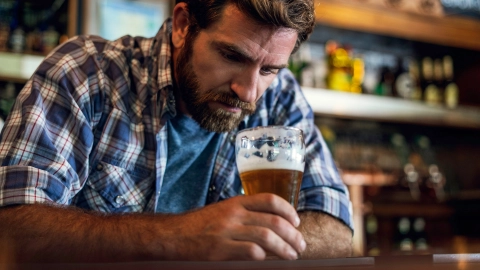Healthy living Gambling addiction (pathological gambling)
ICD codes: F63.0 What are ICD codes?
People with a gambling addiction find themselves unable to quit gambling, despite the fact that it often has a negative impact on their financial situation and on their personal and professional life. Many different support, advice and therapy options are available to help them manage their addiction.
At a glance
- A person has a gambling addiction if they are no longer able to stop gambling even if they want to.
- Gambling addiction is often associated with financial difficulties and has an impact on a person’s partner, family and job.
- Gambling addiction is a widespread problem among young men in particular.
- Gambling addiction is recognized as an illness and the costs of treatment are covered by health insurance funds, local authority administrations or pension insurance organizations.
- Support for managing a gambling addiction is available in the form of inpatient treatment, addiction advice centers and self-help groups, as well as a range of online services.
Note: The information in this article cannot and should not replace a medical consultation and must not be used for self-diagnosis or treatment.

What is a gambling addiction?
Gambling addiction – also known as gambling disorder or compulsive/pathological gambling – is an addiction in which the person affected has an uncontrollable urge to gamble.
Gambling is often easily accessible. For example, slot machines are not only found in arcades where access is restricted but also in freely accessible restaurants and other entertainment venues. The Internet and cellphones also make it easier to access gambling.
Playing slot machines and gaming machines is associated with a particularly high risk of developing a gambling addiction. Other forms of gambling that often lead to addiction include:
- casino games, such as roulette, cards or dice
- online games, such as online poker
- betting on sports and horse racing
What are the signs of a gambling addiction?
People with a gambling addiction experience an uncontrollable urge to gamble by wagering money or valuable items. They find themselves unable to quit gambling even when they suffer serious financial loss, get into debt and risk losing their family, relationship or career.
Typical features of a gambling addiction include:
- An uncontrollable urge to gamble
- Thinking constantly about gambling
- Neglect of personal, family and professional responsibilities
- Lying and engaging in criminal activity to obtain money
- Attempting to recoup money lost by gambling again (chasing losses)
- Withdrawal from activities that were previously enjoyed
- Failed attempts to quit
- Mood swings and sudden outbursts of anger
Which factors increase the risk of developing a gambling addiction?
Most people enjoy having a gamble at some point in their lives. But not everyone becomes addicted to gambling. Certain groups of people are at an increased risk of developing a gambling addiction. Certain types of gambling are also associated with a higher risk of causing people to become addicted to them. Slot machines and online gambling are particularly addictive.
Who is at an increased risk of developing a gambling addiction?
The following groups are considered to be particularly at risk:
- Men
- Adolescents and young adults
- People with a low income level and people currently seeking employment
- People with a low level of education
- People from a migrant background
- Family members of people with a gambling addiction, especially children from a family affected by compulsive gambling
Why are slot machines particularly addictive?
Slot machines are associated with a particularly high risk of gambling addiction because they:
- use a rapid sequence of actions
- make players feel that they regularly have near-wins
- offer tempting opportunities to win big
- convert money stakes into gaming points, so that losses are downplayed
- are widely available
How common is compulsive gambling?
Gambling is very common, with 80 percent of the population having tried it at least once.
According to a study from 2021, 2.3 percent of adults in Germany were addicted to gambling, with the problem affecting more men than women.
Although it is illegal to gamble under the age of 18, around 0.3 to 3 percent of adolescents younger than 18 demonstrate problematic gambling behavior. Boys are affected much more often than girls.
Young men are most likely to gamble with card games, slot machines, sports betting and scratch cards. Online gambling is also becoming increasingly popular.
What are the phases of a gambling addiction?
A gambling addiction progresses in three phases:
- Initial positive phase:
Initial wins convey a positive impression of gambling. Wins are increasingly attributed to one’s own skill rather than to the principle of chance. - The critical habit-forming phase:
The frequency of gambling and the amount of money that is staked both increase. Players try to recoup their debts by gambling even more (debt chasing). In this phase, the person affected can still go without gambling for short periods. - The addiction phase:
Players lose control over the amount of time and money they spend on gambling. Lying, anxiety and feelings of guilt all increase. Negative consequences of the addiction are felt – for example, debt, relationship problems and difficulties at work. Those affected tend to suffer with depression and suicidal thinking. Many are inclined to develop additional dependencies, for example, on alcohol.
How is a gambling addiction diagnosed?
It is often difficult for a gambling addiction to be diagnosed due to the addict not wanting to admit to the problem and attempting to conceal the problem. The problem is often addressed first by family or loved ones.
A gambling addiction is usually diagnosed using a short questionnaire completed by the person affected. A diagnosis can be made by a doctor or psychotherapist.
If someone suspects they may have a gambling addiction, they can seek the advice of an addiction advice center or take an online self-test. However, it should be pointed out that a self-test, while useful, cannot replace a diagnosis by a doctor or psychotherapist.
The Federal Center for Health Education (Bundeszentrale für gesundheitliche Aufklärung, BZgA) offers a gambling addiction self-test.
How is a gambling addiction treated?
Outpatient addiction advice centers, inpatient addiction clinics, self-help groups for addiction and psychotherapists can all help people to manage their addiction. However, only around one in five people with a gambling addiction use the help that is available. Often, feelings of shame, a desire to cover things up and a need to try to solve the problem on their own prevent those affected from seeking support.
Important: Health insurance funds, local authority administrations or pension insurance organizations will cover the cost of treatment for gambling addiction.
People can be treated for a gambling addiction on an inpatient or outpatient basis. Outpatient treatment is aimed at people who:
- are in regular employment
- have a stable living situation
- have a social support system around them
- are prepared to be active participants in their treatment and to quit gambling
- can easily access the therapy center
If these conditions are not met, inpatient treatment in a hospital, clinic or other therapy center can help to break the cycle of gambling addiction. Inpatient treatment is also advised if the person has other conditions and dependencies.
The addiction to gambling is treated in individual or group therapy sessions. These focus on various aspects:
- understanding/acknowledgment of the gambling addiction
- determining the causes of the gambling addiction
- building the motivation to change
- developing self-control
- managing money and debts
- establishing social contacts
- strategies to prevent a relapse
- learning relaxation techniques and problem-solving skills
Loved ones often also participate in therapy. In addition, joining a self-help group can also help people to manage their addiction and stabilize their recovery.
How can a gambling addiction be prevented?
There are various approaches to preventing an addiction to gambling. These include programs to raise awareness as well as legal regulations and restrictions. For example:
- Information campaigns and education programs for schools and sports clubs
- Restricting the number of locations that offer gambling
- No gambling locations in disadvantaged urban areas
- Unattractive gambling locations
- Limiting opening times
- Controlled entry and identity checks
- Placing bans on alcohol consumption and smoking
- No nearby cash terminals and limits on cashless payments
- Limiting highly addictive games
- Raising awareness about the odds of winning and losing
- Changing the structure of games – limiting stakes, wins, losses and game speed
- Limiting and banning advertising
- Indicating support options
- Training staff in the early detection of problematic gambling behavior
- Gambling block information and services
What is a gambling block?
A gambling block, also known as a player block, prevents people from gambling. A person with a gambling addiction can exclude themselves from gambling using a gambling block. This is known as self-exclusion.
Important: Self-exclusion offers a promising means for people to protect themselves from gambling addiction and its consequences.
Family members of those affected and gambling providers can also apply to have individuals blocked from gambling. This is known as third-party exclusion. In Germany, all lottery companies, casinos, slot machine operators and government-licensed betting shops and online gambling providers are members of the nationwide OASIS player blocking system.
For more information about gambling blocks, see check-dein-spiel.de – a service provided by the Federal Center for Health Education (Bundeszentrale für gesundheitliche Aufklärung, BZgA).
Where can more information and support be found?
There are many ways to seek advice and information about this topic by phone, in person or online.
For a comprehensive overview of the various support options available, see bundesweit-gegen-gluecksspielsucht.de.
Where can I get advice over the phone?
For free, anonymous advice, the Federal Center for Health Education (Bundeszentrale für gesundheitliche Aufklärung, BZgA) can be contacted by phone seven days a week by dialing 0800 - 137 27 00. Telephone counseling is provided from 10 a.m. to 10 p.m. Monday to Thursday and from 10 a.m. to 6 p.m. Friday to Sunday.
The hotline of the working group on gambling addiction at the Charité University Hospital in Berlin is available to people with an addiction and their loved ones on 030 - 450 617 333 – callers can remain anonymous if they wish. Telephone counseling is provided on Tuesday and Thursday from 10 a.m. to 4 p.m.
The helpline of the Professional Association for Gambling Addiction (Fachverband Glücksspielsucht e.V.) can be reached by dialing 0800 - 0776611. Support is also available in Russian and Turkish. For support in Russian, dial 0511 - 7014661. For support in Turkish, dial 0800 - 3264762.
Which websites provide information about gambling addiction?
Information about gambling addiction, as well as contact details for or links to help and support services are available online at:
Some websites offer self-tests that allow people to assess their own gambling behavior and determine whether they may have a problem. For example:
The Federal Center for Health Education (Bundeszentrale für gesundheitliche Aufklärung, BZgA) also offers a free and anonymous online quitting program called “Check out”.
Where can I find an advice center close to me?
There are 1,400 addiction advice centers in Germany and 300 of these specialize in supporting people with a gambling addiction and their loved ones.
The German Center for Addiction Issues (Deutsche Hauptstelle für Suchtfragen e.V., DHS) provides a zip code search that lists local advice centers – see dhs.de.
The federal state coordinating bodies for gambling addiction (Landeskoordinierungsstellen Glücksspielsucht) also provide a search function for local counseling services.
- Bundeszentrale für gesundheitliche Aufklärung (BZgA). Check Dein Spiel. Selbstsperre und Fremdsperre. Aufgerufen am 15.06.2022.
- Buth S, Meyer G, Kalke J. Glücksspielteilnahme und glücksspielbezogene Probleme in der Bevölkerung – Ergebnisse des Glücksspiel-Survey 2021. Institut für interdisziplinäre Sucht- und Drogenforschung (ISD). 03.2022.
- Charité Universitätsmedizin Berlin. Beratung und Therapie. Aufgerufen am 30.05.2022.
- Charité Universitätsmedizin Berlin. Problematisches und pathologisches Spielen. Aufgerufen am 30.05.2022.
- Deutsche Hauptstelle für Suchtfragen e.V. Pathologisches Glücksspielen. Aufgerufen am 01.06.2022.
- Hayer, T. Jugendliche und Glücksspiele: Spielanreize und Suchtgefahren im Überblick. Zeitschrift für Jugendkriminalrecht und Jugendhilfe 2020. 30-36.
- Hayer T, Meyer J, Girndt L. Glücksspiele und Glücksspielsucht: Ausgewählte Forschungsbefunde und Herausforderungen für das Suchthilfesystem. Rausch 2018. 340-348.
- Lutz S. Glücksspielsucht. 1. Auflage. Psychiatrie Verlag: Köln 2016.
- Meyer G, Bachmann M. Spielsucht: Ursachen, Therapie und Prävention von glücksspielbezogenem Suchtverhalten. 4. Auflage. Springe: Bremen 2017.
- Müller A, Müller K, Wölfling K. Verhaltenssüchte – Pathologisches Kaufen, Spielsucht und Internetsucht. 1. Auflage. Hogrefe: Göttingen 2018.
- Sonnenmoser M. Glücksspielsucht: Junge Männer besonders gefährdet. Deutsches Ärzteblatt. 2.2015.
- World Health Organization (WHO). The epidemiology and impact of gambling disorder and other gambling related harm. 6.2017.
Reviewed by the German Association for Psychiatry, Psychotherapy and Psychosomatics (Deutsche Gesellschaft für Psychiatrie und Psychotherapie, Psychosomatik und Nervenheilkunde e.V.).
As at:





